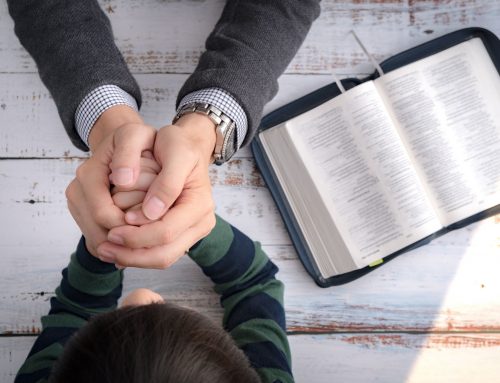Can We Please Have Some Judgment
Luke 9:51-62
A Sermon by Pastor Eric Smith
Published On: June 26, 2022
Luke 9:51-62
A Sermon by Pastor Eric Smith
Published On: June 26, 2022
Our focus today is the first portion of the scripture reading. I’m going to paraphrase with some comment.
Jesus was headed to Jerusalem. There were no Motel 6’s on that route … so he sent some folks ahead to see if arrangements could be made for his traveling group. They would soon arrive at a Samaritan village that was on their way. But there was a complication – the Samaritan folks wanted nothing to do with Jesus or his followers… because they were Jews.
We’re not familiar with those ancient tensions between Jews and Samaritans. Today when we think of Samaritan we think “Good Samaritan” … like the story Jesus told.
That reference clouds our ability to see what was taking place. Bring to mind that the title “Good Samaritan” never occurs in the Bible. It is one of those titles that nicknamed the story and it stuck. But in fact, those two words, Good Samaritan, when put together were an ancient oxymoron. There was no such thing. Not true for us today – but certainly true when the Gospel of Luke was written.
Samaritans were by their ethnicity, mostly Jewish… but they lived by a different interpretation of the Torah. Comparing Jews and Samaritans would have been sort of like comparing Southern Baptists and Latter Day Saints… but with less respect, little compassion, and lots of animosity.
Jews were of the opinion that Samaritans were as low as you could go…worse than Gentiles. Do you get the flavor? These two groups did not mix.
But by that time Jesus was a celebrity. Everyone had heard of him. So… upon learning of how the Samaritan village had rejected the possibility of a visit two of Jesus’ disciples, James and John, were incensed.
The passage deals with the beginning of Jesus journey to Jerusalem. In the Gospels it is both a physical and a spiritual journey. On the way Jesus had to travel through Samaria. Luke’s audience also knows that Samaria was the territory where Elijah and Elisha had been prophets.
We spoke of Elijah and King Ahab last week. Another king, not Ahab, had sent many men to arrest Elijah. Elijah had called down fire from heaven to destroy them (2 Kings 1:10,12). Then recall that James and John were with Jesus on the Mt. of Transfiguration when Moses and Elijah appeared with Jesus. So, when James and John asked, Lord, do you want us to command fire to come down from heaven and consume them? It was a statement in context.
There was mutual hostility between Jews and Sarmatians. Their racist rejection caught Jesus and his followers. James and John wanted to retaliate. Let’s stamp out those racists! Let’s hate those who hate us!
Jesus would have none of it.
Bill Watterson, the creator of the comic strip, Calvin and Hobbes captured the spirit of the encounter in one of his comic strips. Calvin says to Hobbes: It’s hard to be religious when certain people are never incinerated by bolts of lightning.
I was introduced to racism by my friend John Robert – the Rev. Dr. John Robert Kilgore. He is married to Barbara, my spinach sermon source. We met in seminary and have been dear friends since then. John is an African American man. Now 80 years old, he has been not only a dear friend but a mentor to me.
When I was growing up here Coronado didn’t have many African American members of the community. Those who grew up here had very little exposure to the tensions between white and black people.
Well… in 1966 John was given the position as the first Black supervisor at the Reynolds Aluminum plant in rural Arkansas. He was in charge of 60 men, from surrounding rural areas who he affectionately described as red-necks. He told lots of stories about how it came to be that they learned to trust each other.
One day while we were in seminary John asked me go with him to a meeting with the dean of the seminary. He said, I want to show you something.
John is taller than I am and dark skinned. We met the dean who was a well-dressed fine Southern gentleman sporting a Phi Beta Kappa key. The conversation began cordially. Then John inquired about the curriculum, which was the point of the meeting, specifically about where students might encounter instruction in love and loving in the seminary curriculum. (Skills that pastors need)
The dean tensed and the meeting went from cordial to cold. For no apparent reason. I wouldn’t have believed it if someone described what happened to me, but I saw it myself. Something about an African American student asking the distinguished white dean about how seminary students getting ready to serve churches were to learn about loving peope that was threatening to the dean.
The tensions of race, whether black and white or Jewish and Samaritan, employ the practice of judgement.
This teaching of Jesus about judgement is familiar to us. (Matthew 7:1)
Do not judge, so that you may not be judged.
We get that. There have been situations where we felt people judging us, and it doesn’t feel good.
Frederick Buechner has a gentle, but incisive perspective… he wrote…
We are all of us judged every day. We are judged by the face that looks back at us from the bathroom mirror. We are judged by the faces of the people we love and by the faces and lives of our children and by our dreams. Each day finds us at the junction of many roads, and we are judged as much by the roads we have not taken as by the roads we have.
I figured I’d better look at the definition of judgement… and here’s what I found…
Judgement is…
- the ability to make considered decisions or come to sensible conclusions.
- an opinion or conclusion.
- a decision of a court or judge.
The decision of the Supreme Court to overturn Roe v. Wade was a big judgement. It’s not the topic of this sermon… except to say one thing: underneath the issues of when life begins or when life is viable, there is a cold hard insinuation revealed in this Supreme Court decision. It shows us how much of our culture views women … which is, with a lack of trust. I am sorry for that. I think the Universe is sorry for that.
Tamara Levitt is an author and a voice-over artist. She narrates sessions on a meditation app called Calm. She shared a story in one session about a team of researchers trying to study a group of gorillas in a jungle.
The research team tried to get close to the gorillas a few times. Before attempting to do that, they would gather supplies and pack their gear, which always included guns for protection, in case of an emergency. The researchers would then set out, in the hope of getting close enough to study the gorillas. But the gorillas pushed them back.
Until, one day, a lone researcher decided to travel to the camp, without any gun. The gorillas welcomed this unarmed researcher into their home. They allowed him to stay in close proximity while he observed them and then they invited him into their larger camp.
Tamara Levitt went on to add a lesson for all of us as we negotiate and engage with others in day-to-day life. She said: “Often when we approach a challenging situation where uncertainty is high, we are, so to speak, armed. Without even realising it, our shields are up, our mind is closed and we’re projecting an air of defensiveness, perhaps even hostility. And people can sense our aggressive energy so they respond by putting up their shields and no one breaks through to anyone.
“But when we approach people from a place of openness, the result is altogether different. If we’re patient, compassionate and understanding, people pick up on those qualities. And they relax and open up. If you notice yourself approaching a situation with tension or hostility, see what difference it makes when you enter the jungle unarmed and with an open heart.”
We don’t like to be judged. We don’t like it when someone forms a negative opinion of us.
Larry Delrose wrote a book called “Directions to a Happy Life.” He gave me a copy and after spending a few days with it I bought four more copies so that I could give one to each of our children. One of his “directions” concerns Being Judgmental…
This is something we all do that’s bad. When some politician comes on television, we judge, we say He’s a crook. When we see a stranger who doesn’t happen to smile, we say he or she is stuck-up. When we see someone dressed poorly, we think he or she is poor or probably unemployed. This thinking is bad for our minds and spirits, and it is really a complete waste of time for our brains. If you can’t look at people, things, or events in a positive light at least try to look at them in a neutral way.
It’s good advice… and good judgment.
Let’s finish with what the Gospel teaches. It’s not as simple as do not judge… there is a fair amount of judgement delivered by Jesus. Almost from the day his public ministry began, religious authorities of that day perceived Jesus’ words and deeds as judgement of their trusteeship of the revelation of God. And they were right.
All the religious players understood, that, in God’s realm, there would someday be a final judgement – when every person would face the presence of God and God’s final judgement. We called it, standing before God. The great and terrible Day of the Lord. What folks didn’t get, both then and now, is that the death and resurrection of Jesus changed the game.
A preacher can, with the greatest of ease, tell the folks that God is going to get them, and for the most part they will believe it. Aids? Judgement from God. COVID? Judgement from God? Big natural disaster? Judgement from God. Most people will accept that.
But, what is far more difficult, yet true (where the other is not), is to proclaim that Jesus has taken away all the sins of the world and that there is no longer a need for judgement. As the Apostle Paul said, there is … now no condemnation to those who are in Christ Jesus. (Romans 8:1)
Someone says… But what about Hitler? What about child molesters? What about my lousy neighbor? The pressing worry is always, What have you done with the hell that we know and love?
Simply put, the final judgement of the Gospel of Jesus Christ is forgiveness. Heaven is populated by nothing but forgiven sinners … and hell is populated by nothing but forgiven sinners. The difference between heaven and hell is simply that those in heaven accept God’s endless forgiveness while those in hell reject it. The only judgement is your own.
The liturgies of the historic Church… both Eastern Orthodox and Roman Catholic… contain a prayer of Confession… which is always followed by these words (or something similar)…
Hear the good news:
Christ died for us while we were yet sinners.
In the name of Jesus Christ, you are forgiven!
Let me leave you with a story…
Fiorello La Guardia was the mayor of New York City from 1933 to 1945. He was a popular figure and well-loved both during and after he held office. One time he was presiding as the judge of police court…
It was a bitter cold day when they brought a trembling old man before him, charged with stealing a loaf of bread. His family, he said, was starving. I’ve got to punish you, said La Guardia. The law makes no exception. I can do nothing but sentence you to a fine of ten dollars.
But La Guardia was reaching into his pocket as he added, Well here’s the ten dollars to pay your fine. And now I remit the fine.
He tossed a ten dollar bill into his famous sombrero.
Furthermore, he declared, I’m going to fine everybody in the courtroom fifty cents for living in a town where a man has to steal bread in order to eat. Mr. Bailiff, collect the fines and give them to the defendant!
The hat was passed and an incredulous old man, with a light of heaven in his eyes, left the courtroom with a stake of forty-seven dollars and fifty cents.




